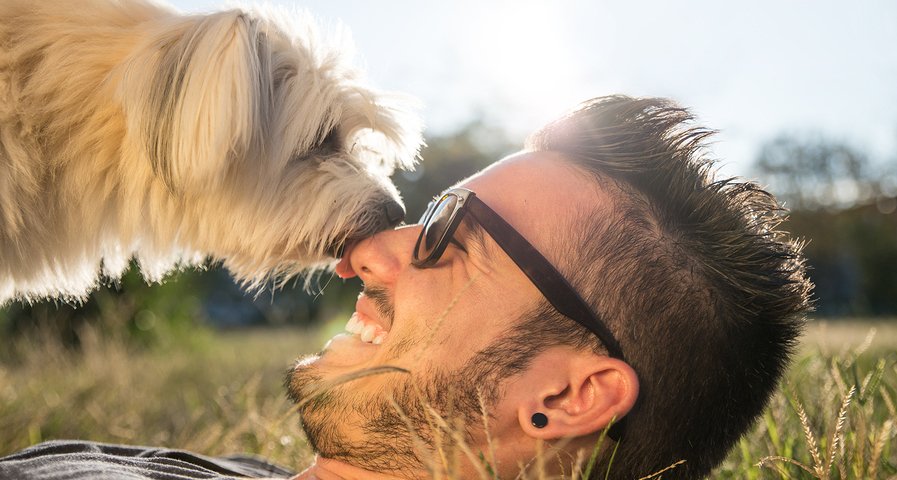It’s hard to know if we modern folks are crazier about our pets than ancient people were about theirs, but we do know that domestic animals have been part of households since the Stone Age. We also know that, today, half of all dog owners and 62 percent of cat owners sleep with their pets, 76 percent give holiday presents to their dogs,1 Newport, Frank, Jones, Jeffrey M., Saad, Lydia and Carroll, Joseph. “Americans and Their Pets.” 2 December 2006. Gallup. 28 October 2016. http://www.gallup.com/poll/25969/americans-their-pets.aspx and 40 percent say they’d rather hang out with their pets than with their partners.2 Kanner, Bernice. Are You Normal About Sex, Love, and Relationships? February 2004. MacMillan. 28 October 2016. Page 122. Given these realities, it’s no surprise that kissing pets is common practice, and that animals return the favor in spades, licking their owners on whatever surface of skin they can access.
There’s a surprising amount of controversy about whether all that licking benefits humans or puts them in danger. Just last week, the New York Times published an article warning of dire consequences connected to doggy saliva.3 Mele, Christopher. “Should You Let Your Dog Lick Your Face?” 22 October 2016. New York Times. 28 October 2016. http://www.nytimes.com/2016/10/22/us/should-you-let-your-dog-lick-your-face.html?partner=rss&emc=rss&_r=2 Animal mouths are “an enormous oral microbiome of bacteria, viruses and yeast” said expert Dr. Neilanjan Nandi, an assistant professor of medicine at Drexel University College of Medicine in Philadelphia in the article. His point was that humans shouldn’t let dogs lick their faces at all because certain things that thrive in canine mouths can transfer to humans and wreak havoc.
Take worms, for instance. You can contract roundworms and hookworms by coming in contact with infected fecal matter, and your pet certainly can make that possible. Say your pet licked the butt of an infected animal, as dogs have been known to do, or ate stool, or licked his own infected anus, or even ate dirt where stool previously had been—and then licked your face right after.4 “Can Humans Get Worms From Pets?” 15 December 2010. Petful. 28 October 2016. http://www.petful.com/pet-health/can-humans-get-worms-from-dogs/ If your mouth was open and Fido hit the jackpot, the worms could enter your system. Or, if he already has worms and licks your arm and then you touch the wet spot and unthinkingly stick your finger in your mouth, it’s all over.
But such occurrences are extremely rare, and in fact, very few people contract worms via pet kisses. Part of the reason for the low incidence is that the worms need to be at just the right stage of development in order to be infectious. If the worms aren’t yet mature—and it can take several weeks for them to get to that stage—you won’t get infected even if your dog lands his contaminated tongue right on yours.5 Tudor, Dr. Ken. “Pet ‘Kisses’: Health Hazard or Health Benefit?” 22 January 2016. Pet MD. 28 October 2016. http://www.petmd.com/blogs/thedailyvet/ktudor/2014/jan/are-dog-licks-unhealthy-for-people-31207 You are far more likely to contract worms via a flea bite or by walking barefoot over soil where an infected animal previously pooped.
But worms aren’t the only horror that you can catch via your dog’s amorous advances. Fido’s lick on your smacker can cause you to contract clostridium, E. coli, salmonella or campylobacter, all of which can cause severe intestinal disease. Again, getting such a disease from your dog is highly unlikely unless your mouth is wide open when Fido’s tongue lands, but such things can and do happen, even if only rarely.
That said, there is one infection that might be particularly worrisome. There was a Japanese study back in 2011 that concluded dog saliva can exacerbate periodontal disease in humans.6 Pajer, Nicole. “Should You Kiss Your Dog?” Cesar’s Way. 28 October 2016. http://www.cesarsway.com/dog-care/health-and-care-issues/should-you-kiss-your-dog The study, published in the Archives of Oral Biology, found that dog mouths typically contained three types of oral-disease causing bacteria that human mouths rarely harbor. When the researchers examined plaque from the teeth of owners whose dogs had these types of bacteria in their mouths, they found that all the owners had the same strains of bacteria that their pups had. The sample size was very small—just 13 dogs and their people—but still, it’s kind of worrisome if you and your canine are kissing cousins.
What about cats? While dogs can harbor worms and transmit them orally, cats don’t eat feces or lick butts, and so the chances of transmission via cat mouth are almost nil. Cats also tend to be less licky than canines are. Cats do, however, pose other threats. Should Fluffy decide to bite or scratch you, even in play or love, you potentially could contract bacterial infections known as pasteurella or the eponymously named cat scratch fever, both of which cause potentially serious skin and lymph node infections.
Do these tales of poop-mouth and germ-jaw have you thinking that your dog better keep his mouth to himself? Wait! Before you banish the poor mutt to the land of no kisses where you former beaus reside, you should know that there’s another side to the story. Several studies have found that dog saliva can speed up wound healing, just as the ancient Egyptians and Greeks believed. A Netherlands study found that dog saliva contains a substance called histatin, which helps new cells to spread. Other research found that when saliva contacts skin it creates nitric oxide, which inhibits bacteria and infection, and a protein in saliva called Nerve Growth Factor that halves the time for wound healing. And as pointed out in Psychology Today, of all places, “the saliva of a dog’s tongue acts to loosen any debris that may be on the surface of the wound. Any dirt or other debris will also become attached to the moisture of the saliva, thus at the very least, the area of the wound will be cleansed.”7 Pajer, Nicole. “Should You Kiss Your Dog?” Cesar’s Way. 28 October 2016. http://www.cesarsway.com/dog-care/health-and-care-issues/should-you-kiss-your-dog
Now scientists think that dog saliva might actually boost immunity and help alleviate allergies and asthma. Scientists have long recognized that kids brought up with dogs have lower rates of asthma, allergy, and immune-related skin conditions like eczema.8 Parry, Lizzy. “Could a kiss from your dog be GOOD for you? Canine germs may ‘act as a probiotic’ experts say.” 19 March 2015. Mail Online. 30 October 2016. http://www.dailymail.co.uk/health/article-3002666/Could-dog-kiss-GOOD-Canine-germs-act-probiotic-experts-say.html The reason, researchers hypothesize, is because canine saliva might work as a kind of probiotic, inoculating people against allergens. To test the theory, scientists at the University of Arizona are assigning rescue dogs to subjects over the age of 50 and monitoring the gut flora and immune function in the people over the course of several months as the dogs settle in with them. Incidentally, s hould the humans fall in love with their assigned canine study partner in the course of the research, they’ll be allowed to adopt.
So should you be kissing your pet or not? It’s probably wise to keep your mouth shut when your pet decides to slobber your face and also to be conscious enough to not go sticking saliva’d-up fingers in your mouth. On the other hand, if you feel brave and love your hound to pieces, you might have him lick your boo boo when you scrape your knee and let him lick more neutral places—until the University of Arizona research sheds more light.
References
| ↑1 | Newport, Frank, Jones, Jeffrey M., Saad, Lydia and Carroll, Joseph. “Americans and Their Pets.” 2 December 2006. Gallup. 28 October 2016. http://www.gallup.com/poll/25969/americans-their-pets.aspx |
|---|---|
| ↑2 | Kanner, Bernice. Are You Normal About Sex, Love, and Relationships? February 2004. MacMillan. 28 October 2016. Page 122. |
| ↑3 | Mele, Christopher. “Should You Let Your Dog Lick Your Face?” 22 October 2016. New York Times. 28 October 2016. http://www.nytimes.com/2016/10/22/us/should-you-let-your-dog-lick-your-face.html?partner=rss&emc=rss&_r=2 |
| ↑4 | “Can Humans Get Worms From Pets?” 15 December 2010. Petful. 28 October 2016. http://www.petful.com/pet-health/can-humans-get-worms-from-dogs/ |
| ↑5 | Tudor, Dr. Ken. “Pet ‘Kisses’: Health Hazard or Health Benefit?” 22 January 2016. Pet MD. 28 October 2016. http://www.petmd.com/blogs/thedailyvet/ktudor/2014/jan/are-dog-licks-unhealthy-for-people-31207 |
| ↑6, ↑7 | Pajer, Nicole. “Should You Kiss Your Dog?” Cesar’s Way. 28 October 2016. http://www.cesarsway.com/dog-care/health-and-care-issues/should-you-kiss-your-dog |
| ↑8 | Parry, Lizzy. “Could a kiss from your dog be GOOD for you? Canine germs may ‘act as a probiotic’ experts say.” 19 March 2015. Mail Online. 30 October 2016. http://www.dailymail.co.uk/health/article-3002666/Could-dog-kiss-GOOD-Canine-germs-act-probiotic-experts-say.html |











